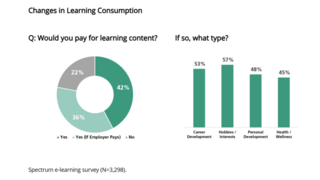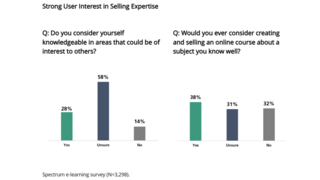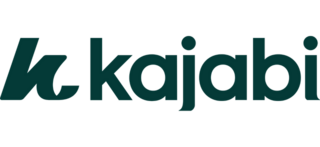Partnership Announcements| November 2019
Kajabi: Enabling Digital Creators to Transform Online Learning
The digital education market is growing rapidly, and individuals increasingly turn first to the internet for both their business and personal learning needs. Creators are emerging en masse to meet this demand for online education content and finding they can create meaningful businesses behind this trend – ranging from tutorials on home improvement to makeup tips to coding best practices. Regardless of what individuals want to learn, there is a robust, long-tail of content being created to meet those learning needs. Furthermore, traditional offline entrepreneurs are now using digital content to build loyal followings, create new digital revenue streams and ultimately grow their brick and mortar businesses.
Despite these tailwinds, building and scaling an online business presents difficulties for almost every entrepreneur. While these creators know their subject areas deeply and are capable of creating exceptionally high-quality content, they often do not know how to get that expertise into a digital format nor have they mastered the art of marketing, web design and data analytics – all critical elements of a successful online business.
Kajabi co-founder and CEO Kenny Rueter experienced these problems firsthand when he tried to scale his digital business. When he went to find software solutions to help, he found a market littered with point solutions that solved some issues but were not interoperable and, in aggregate, were cost prohibitive. Looking to fill this gap, the team built Kajabi – an all-in-one platform that makes it easy to create online courses, design effective websites, launch marketing campaigns and build landing pages. By streamlining the digital solutions of creating and maintaining an online business into a single platform, Kajabi saves entrepreneurs time and resources, so they can put more effort behind building content their customers love.
At Spectrum, we have watched the above-mentioned trends closely and witnessed how Kajabi’s unique platform enables its subscribers to capitalize on this market opportunity. That is why, today, we are excited to welcome Kajabi to the Spectrum Equity portfolio.
We are thrilled to be partnering with the team at Kajabi. Like so many of our partners, the Kajabi team’s success comes from an intense focus on its customers and that focus translates into a world-class product. Kajabi takes personal pride in helping subscribers achieve their visions of success, and that continues to drive the Kajabi team to innovate and deliver value to its subscribers.
Below we’ve shared some additional detail on our thesis and why we are so excited about this investment.
Demand for Online Learning Continues to Grow
The demand for digital educational materials continues to grow, and today the online education market represents a $220 billion market. This market opportunity exists partly because the internet has become the preferred medium through which individuals want to learn. Furthermore, the vast majority of individuals are willingto pay for educational content (78%) as demonstrated by our survey work. That interest is not limited to professional training – 57% of individuals want to pursue hobby-related educational interests.

This demand not only drives the growth of the overall market but also creates the need for content that caters to the long-tail of human interests. Individuals are not just looking for traditional and broad subjects but instead want to learn about a highly diverse and specific set of topics.
Rise of the Creator and Entrepreneur
The internet made it possible for any individual to share their thoughts, ideas or expertise with a vast audience, although reaching a broad audience isn’t necessarily easy. Today, over 500 hours of content are uploaded to YouTube every minute, serving 2 billion monthly active users. While not all of this activity is related to education, it does highlight the fact that individuals are increasingly comfortable creating shareable content, and that there is a broad audience for user-generated content. Approximately 30% of individuals surveyed think they have something valuable to share and nearly 40% would be willing to share it online.
Strong User Interest in Selling Expertise

Just as individuals have become increasingly comfortable creating and sharing content, they have also become increasingly comfortable trying to start their own businesses. 35% of American workers are engaged in some “side hustle” outside of their primary careers. For all the reasons we highlighted, online education represents an attractive market for these people to pursue.
Furthermore, many individuals are finding that educational content is valuable to grow their existing businesses. Individual entrepreneurs and SMBs use content to showcase their expertise, build a loyal following, add digital revenue streams and drive offline results.
Kajabi Focuses on the Online Learning Creator
Kajabi’s subscriber base of approximately 25,000 entrepreneurs is a perfect case study for the points raised above. The company is meeting this market-demand head on and the results are nothing short of incredible. To date, Kajabi creators have generated more than 2 million videos across subject matters, including personal fitness, life coaching, wellness, beauty, sports and the arts. These courses have generated over $1 billion and are on pace to generate more than $400 million in annual gross merchandise value.
Kajabi stands out among competitors because it is entirely creator-focused. The company allows subscribers to customize their storefronts, create and manage content and sell and market in one integrated platform. Distribution platforms like YouTube and Udemy are undoubtedly important for entrepreneurs, but they strip creators of valuable resources that would help them grow sustainable businesses and build their brands.
The company’s all-in-one platform means subscribers have a single platform through which they can manage all aspects of their business. As a result, entrepreneurs are not stuck with point solutions that do not work seamlessly together and, in aggregate, are very expensive. Despite offering an all-in-one solution, the company still integrates with over seventy point solutions (LMS, CMS, CRM, web analytics, email marketing and accounting solutions) to make sure subscribers are always able to optimize for their ideal technology stack.
Building On Our Track Record
Investing in Kajabi continues Spectrum’s long, successful track record of supporting product and customer-driven businesses as well as our ongoing interest in SaaS companies that enable SMBs and entrepreneurs to succeed. We’ve already seen this with Grubhub, Jimdo and The Knot Worldwide, as well as our investments in education efforts including, DataCamp, DMI, Lynda.com and Offensive Security.
We are thrilled to partner with Kajabi co-founder and CEO Kenny Rueter and President Jonathan Cronstedt as the online learning market continues to grow and evolve. We look forward to helping the company capitalize on this momentum.
For more information on Kajabi and Spectrum Equity’s growth investment, please read the press release.
Content contained in this blog post is not intended to and does not constitute investment advice. Your use of the information in this blog post and materials linked is at your own risk. Spectrum Equity does not make any guarantee or other promise as to any results that may be obtained from using this content. No one should make any investment decision without first consulting his or her own financial advisor and conducting his or her own research and due diligence. Past performance is not indicative of future results, and there is a possibility of loss in connection with an investment in any Spectrum Fund. To the maximum extent permitted by law, Spectrum Equity disclaims any and all liability in the event any information, commentary, analysis, and/or opinions prove to be inaccurate, incomplete or unreliable, or result in any investment or other losses. The specific companies identified above does not represent all of Spectrum’s investments, and no assumptions should be made that any investments identified were or will be profitable.



